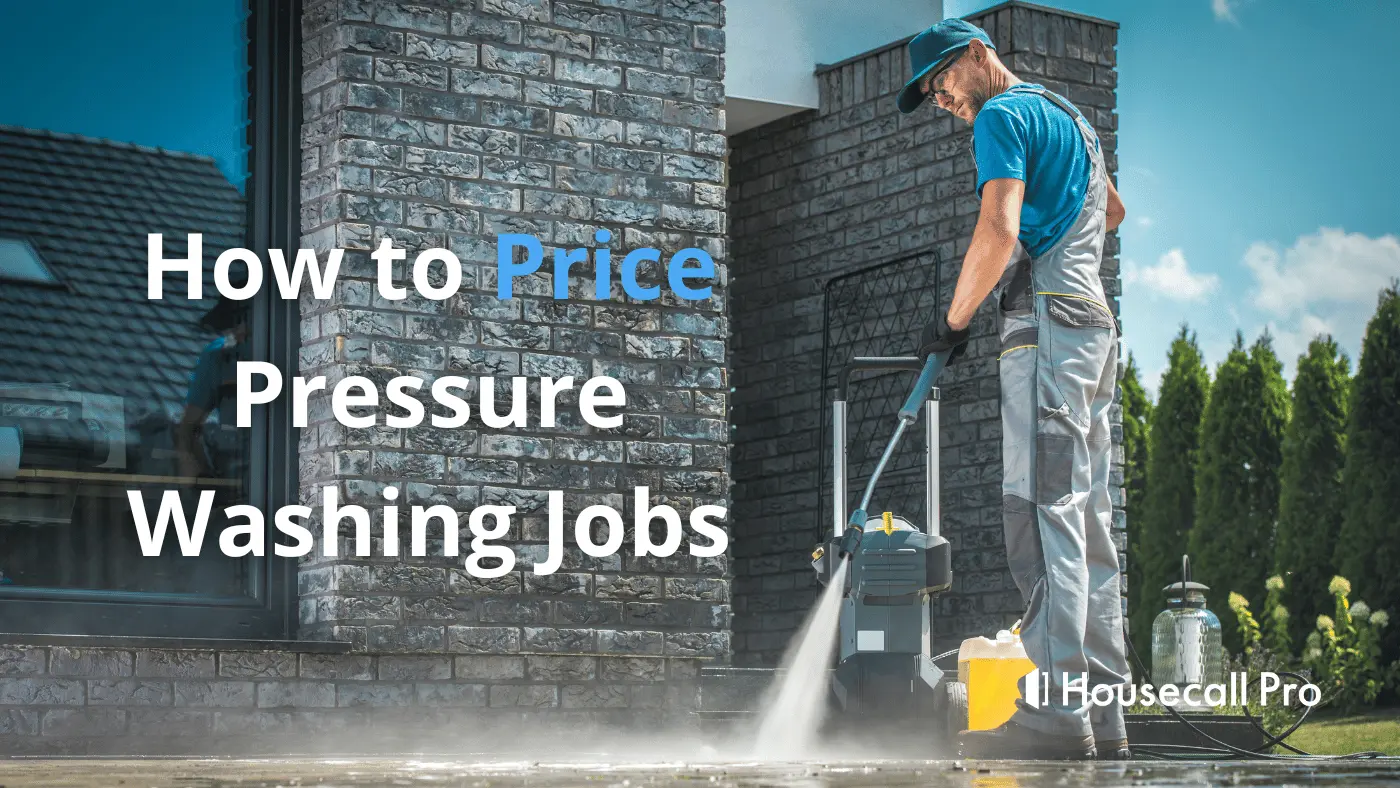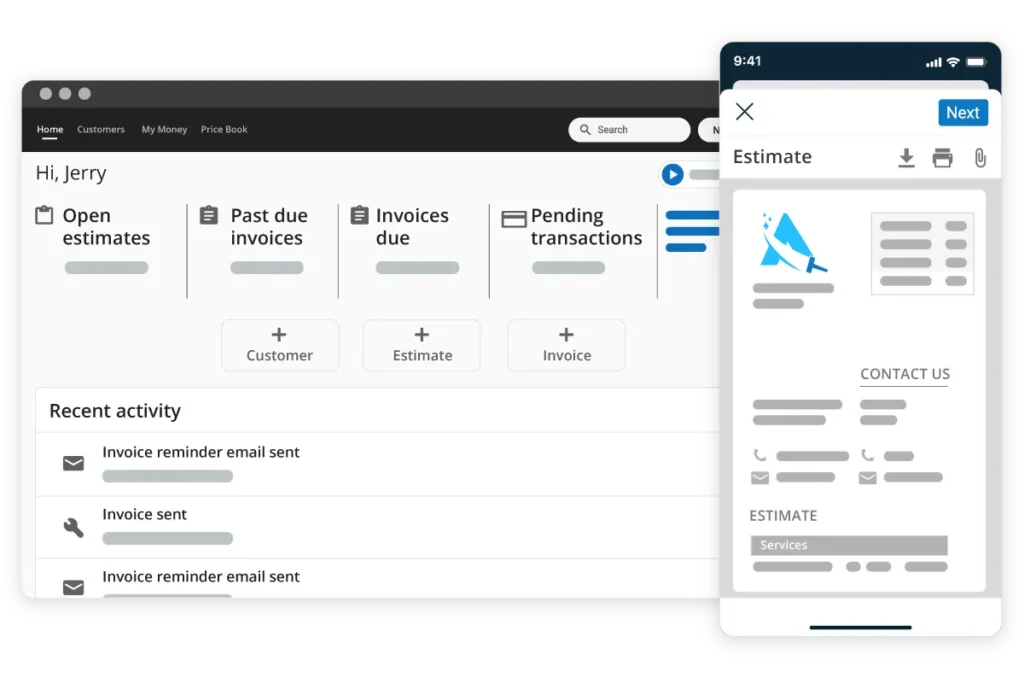Want to win more jobs with less effort?
Grow your business and send quick quotes with our home service software.

Knowing how to price pressure washing jobs is critical. Job costing might sound like a complicated endeavor, but our helpful guide can help get your pressure washing business off the ground and moving effectively.
Proper pricing can impact day-to-day operations, growth, and sustainability. In this step-by-step guide, you will learn more about how to price a pressure washing job, including how to price commercial pressure washing jobs.
Jump ahead to each section
- Residential vs. Commercial Pressure Washing Differences
- Take These Steps to Price Your Pressure Washing Services
- Step 1: Measure Your Working Area
- Step 2: Determine Your Pricing Strategy
- Step 3: Pricing Per Project
- Step 4: Calculate Equipment & Overhead Costs
- Step 5: Calculate Total Costs Plus Desired Profit Margin
- Step 6: Create Your Pressure Washing Quote
- Additional Pricing Factors to Consider
- Streamlining Pricing Jobs with Pressure Washing Business Software
Residential vs. Commercial Pressure Washing Differences
The first step is to learn the differences between residential and commercial pressure washing jobs. Before you can learn how to price out pressure washing jobs, there are a few differences to be aware of ahead of time.
Scope of Work
Right off the bat, the first difference between the two is the scope of work. Residential jobs are often much smaller and involve areas like decks, house exteriors, and driveways. That can take a few hours depending on the task and may be completed by a single person.
Commercial projects, however, tend to be much bigger. A commercial pressure washing job can entail storefronts, parking lots, and entire buildings. Understanding your scope of work is crucial for setting reasonable prices for pressure-washing services.
Equipment Needs
Going hand in hand with the last point is the need for equipment. When pricing pressure washing jobs, equipment is going to be one of the most essential aspects. After all, there is no way to provide quality work if you don’t have the right tools to do the job.
When you learn how to price commercial pressure washing jobs, equipment will be one of the most critical parts. Commercial jobs often require not only larger, more powerful equipment to do the job, but things like specialized cleaning agents as well. Residential jobs are generally going to be less expensive when it comes to determining equipment needs.
Take These Steps to Price Your Pressure Washing Services
Having a clear, systematic approach to pricing is integral. Learning how to price out pressure washing jobs will help you create more accurate pricing, which creates not only better business profitability but can lead to stronger, better client relationships as well. Here’s what you need to do when it comes to pricing out your pressure washing jobs.
Step 1: Measure Your Working Area
Before you can price a pressure washing job, you need to know what kind of working area you’re dealing with. The first step in learning how to price pressure washing jobs is to assess the size of your working area. There are two key ways to do this: square and linear footage.
Square Footage
There are a variety of jobs that are best measured by square footage. Things like decks, fences, sidewalks, driveways, roofs, commercial cleaning, siding, garage floors, and parking lots are all best calculated this way.
To calculate square footage, you will need the length and width of the area. The best way is to use a laser distance measurer. Multiply each side, then multiply that number by 1.35 to determine square footage.
Linear Footage
For other projects, linear footage is a better approach. For things like a boat or house, you measure the length of the structure (ignore thickness and width). Though it is a simpler measurement to come up with, you would tend to charge linear footage at a higher rate than you would square footage.
Step 2: Determine Your Pricing Strategy
When it comes to learning how to price a pressure washing job, the next step is to determine what your pricing strategy is. In the pressure washing industry, there are three common pricing strategies: flat-rate pricing, per-square footage, and hourly rate pricing. Let’s look at each of them.
Flat-Rate Pricing
For experienced pressure washers who have a feel for material costs and the time it takes to complete these projects, flat-rate pricing is a good option. Flat-rate pricing is also easier to navigate, though invoicing software can help mitigate that factor. For the most part, pressure washers charge anywhere from $90-$200, depending on the job.
Per Square Footage
Determining price per square foot is good if you work on a property that has multiple surfaces that require pressure washing. As you learn how to price pressure washing jobs, you will notice that having multiple pricing strategies can be helpful. Depending on the location and scope of the job, charging anywhere between $0.10 to $0.50 per square foot is a good place to start.
Let’s say that you’re working on an area that is 500 sq ft. If you are charging $0.45 per square foot, multiply the two to create your base price ($225). Add any fees like travel to determine your total price. Make sure that it includes all of your materials costs and desired profit margin before quoting the job.
Hourly Rate Pricing
Finally, you have pricing per hour. If you want to cover the total time it takes to finish a job, this is the best strategy to have. Most pressure washing professionals charge between $50 and $100 per hour, depending on the size, the equipment needed, and the location of the job.
Pricing things out can be done similarly to square footage pricing. When you know what it will cost to do the job, you can then quote it on an hourly basis. It is a great way to cover your time effectively.
Step 3: Pricing Per Project
Rates will vary most based on the services provided. If you’re just learning how to price pressure washing jobs, a great place to start is by checking out national averages. It helps to first know what to classify as a residential service versus a commercial pressure washing service.
Residential Pressure Washing Services
Residential pressure washing jobs are often smaller than their commercial counterparts. Residential jobs include two-story homes, decks, patios, driveways, walkways, home exteriors and windows, fences, outdoor furniture, etc. These jobs are smaller and faster to complete.
Commercial Pressure Washing Services
Commercial pressure washing projects are much larger than residential jobs. Storefronts, office buildings, parking lots, business sidewalks, commercial roof cleaning, etc. These are oftentimes well over 1,000 square feet and can be several times larger than that. These are the biggest, most complicated, and most expensive jobs to complete.
Below are some common rates for pressure washing projects to help you get an idea of pricing yours competitively.
| Residential Services | Price Range | Commercial Services | Price Range |
|---|---|---|---|
| Single-story house exterior wash | $200-$1,200 | Small storefront exterior wash (up to 1000 sq ft) | $150-$300 |
| Two-story house exterior wash | $400-$1,400 | Medium office building exterior (1000-3000 sq ft) | $220-$550 |
| Driveway pressure washing (up to 600 sq ft) | $100-$200 | Parking lot cleaning (up to 10,000 sq ft) | $10-$20 per parking space |
| Deck or patio cleaning (up to 300 sq ft) | $100-$200 | Strip mall sidewalk cleaning (up to 500 linear feet) | $250-$500 |
| Roof soft washing | $250-$600 | Commercial roof cleaning (up to 5000 sq ft) | $1000-$3500 |
Step 4: Calculate Equipment & Overhead Costs
Calculating the costs of a job is important if you are going to make a healthy profit margin. Going into a job without knowing what everything will cost you will ensure that you make less than you hoped. Here are a few things to consider when it comes to determining the costs of the job.
Equipment Costs
Perhaps the costliest part of pricing out a pressure washing job is determining what equipment costs there will be. Equipment costs are not only for the actual pressure washers, but also things like gas and vehicle maintenance, specialized chemicals, and anything else that is required to get the job done. It helps to conservatively factor in maintenance for equipment as well because any breakdowns will lead to the need for replacements. That can get to be costly in no time.
Overhead Costs
There are other inherent costs of running a business that must be factored in. Equipment, business insurance, gas for vehicles, marketing, and business software are just a few of the things that you will need to have. Add them all up and then it is time to calculate hourly overhead costs.
To determine that, take your total monthly overhead costs and divide them by the number of billable hours per month. You can then use that to calculate your overhead costs on a single job. Take your hourly overhead costs and divide that by the number of hours it will take to get the job done. Add in any specific materials or chemicals as well.
Get In Touch: 858-842-5746
Let us earn your trust
On average, Pros increase monthly revenue generated through Housecall Pro by 50% after their first year.
See plan options and feature breakdown on our pricing page.
Step 5: Calculate Total Costs Plus Desired Profit Margin
Now comes one of the most important aspects of learning how to price pressure washing jobs and that is determining profit margin. Your profit margin is the amount that you make in profit after things like labor costs, overhead, materials, and more. Profit margin is the lifeblood of the business and can mean the difference between dying and thriving.
To ensure profitability, consider additional expenses like equipment maintenance, labor, and varying job complexities such as roofs with steep pitches or irregular lot shapes.
Total Costs
Before you can determine your profit margin, your business must know the total costs of a job. Every job will have material and overhead costs. Having those costs (check out our section on determining overhead costs above) will allow you to properly price out the job by adding a profit margin at the end.
Profit Margin
To calculate profit margin, use the following formula: Total price = cost / (1-profit margin)
Let’s say that all of your costs on a particular job add up to $193 and you’re looking for a profit margin of 30%. Using the formula – $193 / .70, your total charge will be $275.71 (round up to $276). Depending on how busy your business is, it may be a good idea to adjust your profit margin.
In the beginning, it may be ideal to aim for 20% while building a customer base. With more positive reviews and a growing clientele, start inching your profit margin up rather than having a sharp increase. Prices in virtually any business incrementally increase as it is a natural part of running a business.
Step 6: Create Your Pressure Washing Quote

Finally, it is time to create your pressure washing quote. Providing an accurate quote to the customer is crucial for a few reasons. First, it is clear to the customer what the expectations will be. Secondly, it ensures that there are no curveballs on the business end of things. Here’s what you need to know when creating a quote.
Detailed Breakdown
It is essential to create a detailed breakdown of the services being provided. Include the services you are providing – siding pressure washing, for example. After that, include any materials or chemicals required to do the job, then a separate section for taxes and fees. The customer can see a detailed explanation of where costs are allocated and how you created the total that you did.
Professional Presentation
Appearances are important in any line of work. It is critical to provide customers with a professional invoice for each job. Even a simple but effective professional presentation can provide peace of mind to the customer. Include any logos, business, and customer information, and a detailed breakdown of services.
Additional Pricing Factors to Consider
A common mistake most businesses make is not considering the extras. For instance, what will it cost your business to get to and from the job? Are there any specialized chemicals needed? What about sealing or stain removal?
Those additional factors wind up becoming more costly than you could imagine. Never put your business in a position to have to eat those costs because they will add up before you know it.
Offer Bundled Deals
Offering bundled packages can also enhance your revenue—combine services like house washing, driveway cleaning, and deck washing into a single, attractive deal. This not only increases your average ticket size but also provides customers with better value, encouraging them to choose your comprehensive service over competitors.
Maximize profit margins by introducing routine maintenance contracts. Regular service agreements ensure a steady income and foster customer loyalty, reducing the need for constant new customer acquisition.
Package deals for seasonal maintenance can keep your schedule full year-round, even during slower months. With tools from Housecall Pro, you can effortlessly manage these contracts, schedule recurring jobs, and keep track of all your expenses, ensuring you maintain a healthy profit margin on every job.
Streamlining Pricing Jobs with Pressure Washing Business Software
At the end of the day, learning how to price pressure washing jobs isn’t as difficult as it looks. Having the essential information is a difference-maker and can ensure that you are charging the right amount for each job.
With the help of Housecall Pro’s pressure washing business software, the entire process can be streamlined and the inaccuracies removed. Being able to create estimates, offer booking and scheduling, cost out jobs, and more will make life easier for business owners.
